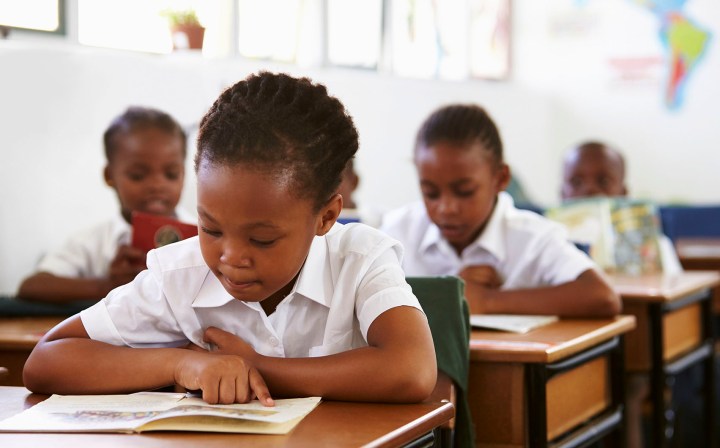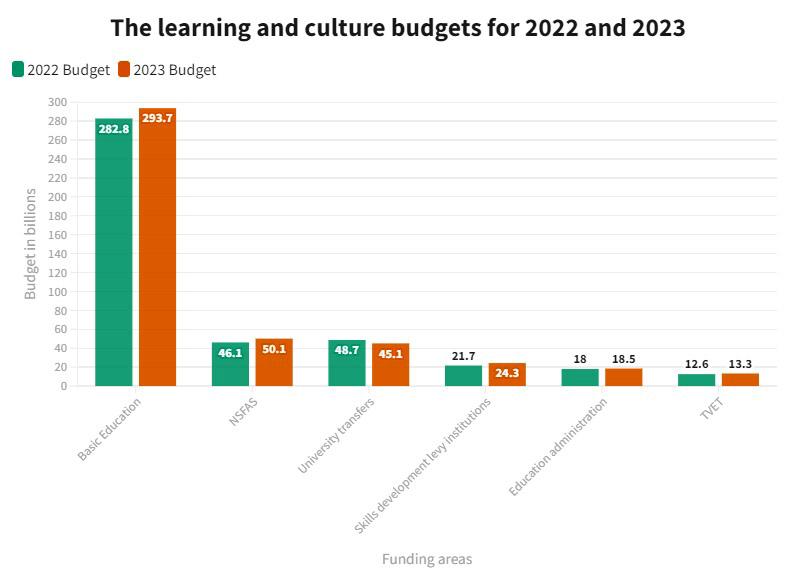BUDGET 2023
Godongwana fails to address looming basic education ‘blackout’, but boosts funding for early childhood development

The 2023 Budget shows a decline in spending on basic education in real terms, despite warnings from experts that the sector is in crisis. Early childhood development, meanwhile, has seen a significant increase in funding, in line with efforts to expand access to early learning programmes for South Africa’s children.
The basic education sector in South Africa is facing a “blackout”, comparable in scale to the country’s crippling electricity crisis. However, there is a distinct difference in the attention these two crises are receiving, both from the public and within the national Budget.
According to Jane Borman, a researcher at Equal Education, schools are facing a dire situation, which is set to get worse as funding for the education sector declines in real terms.
“What we would have liked to have seen is the minister of finance recognising the reality and the scale of the issue that we’re facing in the basic education sector,” said Borman in the wake of Minister Enoch Godongwana’s Budget speech on Wednesday.
“We understand that there are financial constraints, and basic education isn’t the only issue in terms of social spending that needs attention, but we would like to have seen a plan that would allow us to see sustainable change and growth in the basic education system; that would indicate to us that we are on a trajectory to get where we need to be.”

(Source: National Treasury budget expenditure data)
For 2023, the national Budget for learning and culture is:
- Basic education — R293.7-billion;
- NSFAS — R50.1-billion;
- University transfers — R45.1-billion;
- Skills development levy institutions — R24.3-billion;
- Education administration — R18.5-billion; and
- Technical and vocational education and training — R13.3-billion.
Read more in Daily Maverick: “Budget in a box”
Despite Godongwana’s claim in Wednesday’s speech that the 2023 Budget was “not an austerity Budget”, the austerity measures were evident in areas where allocations did not increase in line with consumer price index inflation, including health and education, according to Daniel McLaren, senior researcher and budget analyst at SECTION27.
“In terms of the per-user budget — so if you divide the health budget by every person who [uses the public] health sector and if you divide the education budget by every learner who receives public education — then you get a real-terms decline,” he said.
Overall funding for basic education increased from R302-billion in 2022/23 to R309-billion in 2023/24 — a 2.5% nominal increase, according to SECTION27. This equates to a 2.4% reduction in education funding in real terms, once consumer price index inflation is factored in.
Visit Daily Maverick’s home page for more news, analysis and investigations
Funding per learner was therefore reduced from R22,552 in 2022/23 to R21,630 in 2023/24.
SECTION27 condemned the real reductions to spending on programmes such as the School Infrastructure Backlogs Grant; the HIV/AIDS Life Skills Grant; the Maths, Science and Technology Grant; and the Learners with Profound Intellectual Disabilities Grant, in 2023/24.
“One of the areas of the Budget that has continued to receive decreases is school subsidies — that means the actual subsidy per learner going to each public school is being eroded by inflation… Those schools have less money for operating, maintenance, equipment, data [and] school supplies, each and every year. We’ve seen that in most provinces for about five or six years now, and that continues again in this Budget,” said McLaren.
The decline in spending on basic education is happening in a context where thousands of schools still don’t have access to basic infrastructure and services, according to Borman. Moreover, South Africa continues to rank poorly in international metrics for reading and mathematics.
Read more in Daily Maverick: “Still no national plan to address SA’s reading crisis as percentage of children who can read for meaning declines”
“In children’s schools… there’s going to be less money to provide basic feeding programmes. Schools will probably have to cut their budgets, which might mean cutting basic school support systems that schools themselves take initiative to provide,” she said.
SECTION27 welcomed the 11% increase in funding for the Education Infrastructure Grant in 2023/24. The R13.8-billion allocation should allow provinces to build, repair and maintain school infrastructure, including in KwaZulu‐Natal and Eastern Cape where infrastructure has been damaged by flooding.
Early childhood development
In contrast to the broader basic education sector, early childhood development (ECD) is facing its first break from austerity budgeting in some time. The 2023 Budget shows significant increases in the budget for ECD, according to Laura Brooks, an economist at Ilifa Labantwana.
The campaign for Real Reform for ECD welcomed the increase in the conditional grant for ECD, from R1.24-billion in 2022/23 to R1.88-billion in 2023/24, as a “step in the right direction”. This represents a 51% year-on-year increase in funding for the ECD sector.
“The two pillars of the policy objective for early learning are around access and quality, so there’s this tension around what you prioritise first, and the wording in the Budget… is around increases in access,” said Brooks.
“If you look at what’s made available over the [medium-term expenditure framework], you could potentially see an… up to 40% increase in the number of children subsidised — that’s from the base of around 625,000 [children].
“That then assumes that you’re not increasing the value of the subsidy at all, and we know that’s a problem… it’s been R17 [per child per day] since 2019, and there’s an erosion of its real value if you take into account inflation.”
With only 33% of early learning programmes receiving the per-child-per-day subsidy, significant work needs to take place in order to ensure more children access the funding support, according to the Real Reform for ECD campaign.
“It is essential that a significant portion of the proposed funding is used to close the access gap, so that the 1.3 million three- to five-year-olds currently excluded from ECD programmes can benefit from proper early learning and development opportunities,” it stated.
Nutrition support
A portion of the additional funding for the ECD grant will go towards piloting a nutrition support programme and a “results-based delivery model”, according to the National Treasury’s 2023 Budget Review.
“[The pilot nutrition programme] is really encouraging, and I think it’s a sign that the DBE, with its history of an established nutrition support programme for schools, really wants to pay attention to the nutrition component of early childhood development,” said Brooks.
“They have called it a pilot, which means they want to test ways of reaching early learning programmes. For me, that’s super encouraging because it shows recognition that they can’t just extend the [National School Nutrition Programme]; that the [ECD] sector is unique and complex.”
The results-based service delivery model is also a sign of the state’s willingness to try new things and innovate, she continued. It implies an arrangement where payment will be made to service providers for agreed-upon outcomes.
“We don’t know what those are but it probably also means that there’s an opportunity for government to leverage funding from outside government, to support activities in the sector. This is also encouraging because of course, in a fiscally constrained environment, this has got to be part of the strategy.” DM/MC




















 Become an Insider
Become an Insider
Comments - Please login in order to comment.